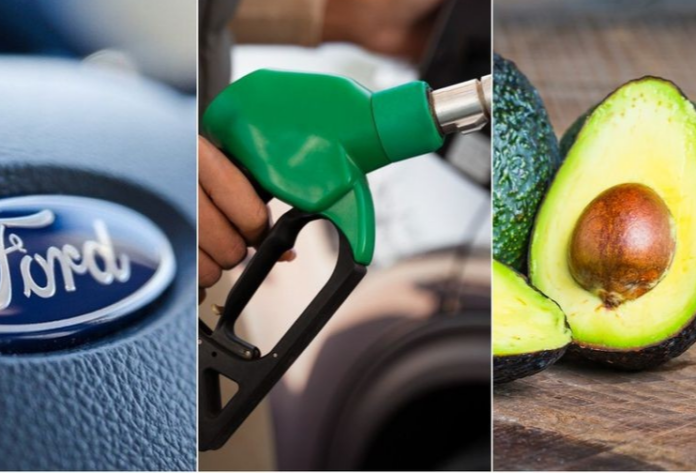US President Donald Trump has signed an order imposing tariffs on Canada, Mexico and China, which will affect the price of some products, as they will now be subject to a fee to enter the US.
Trump declared an economic emergency in order to impose tariffs of 10% on all imports from China and 25% on imports from Mexico and Canada. Energy imported from Canada, including oil, natural gas and electricity, would be taxed at a lower rate of 10%.
Here are some imported goods whose prices could be the first to be affected:
Automobiles

For decades, auto companies have built supply chains that cross the borders of the United States, Mexico and Canada.
More than one in five cars and light trucks sold in the United States were built in Canada or Mexico, according to S&P Global Mobility. In 2023, the United States imported $69 billion worth of cars and light trucks from Mexico — more than any other country — and $37 billion from Canada. Another $78 billion worth of auto parts came from Mexico and $20 billion from Canada. Engines for Ford F-series pickups and the iconic Mustang sports coupe, for example, come from Canada.
Ford has three plants in Mexico
“You have engines and car seats and other things that cross the border multiple times before they are integrated into a finished vehicle,” said Scott Lincicome, a trade analyst at the libertarian-leaning Cato Institute. “You have American parts that go to Mexico to be assembled into vehicles that are then shipped back to the United States.
“If you put 25% tariffs on all of that, it’s just a grenade.”
In a report Tuesday, S&P Global Mobility estimated that “importers will likely pass on most, if not all, of this cost increase to consumers.” TD Economics notes that average car prices could rise by about $3,000—this at a time when the average new car already costs $50,000 and a used car $26,000, according to Kelley Blue Book.
Gasoline

Canada is by far the largest foreign supplier of crude oil to the United States. From January to November of last year, Canada shipped $90 billion worth of crude to the United States, far more than Mexico, which ranks second at $11 billion.
For many American refiners, there isn’t much choice. Canada produces the “kind of crude oil that U.S. refineries are geared to process,” Lincicome said. “It’s a heavier crude. All the fracking and all the oil and gas we produce here in the United States — or most of it — is a lighter crude that many U.S. refineries don’t process, particularly in the Midwest.”
If he were to tax Canadian oil imports, Lincicome said, “how on earth would that be resolved? My guess is that it would be resolved through higher gasoline prices, particularly in the Midwest.” TD Economics estimates that Trump’s tariffs could increase U.S. gasoline prices by between 30 cents and 70 cents a gallon.
Tequila and mezcal
The tariffs would raise the price for those raising a glass of Canadian tequila or whiskey.
In 2023, the United States imported $4.6 billion worth of tequila and $108 million worth of mezcal from Mexico, according to the Distilled Spirits Council of the United States, a trade group. The United States imported $537 million worth of Canadian spirits, including $202.5 million worth of whiskey.
Canada and Mexico were also the second- and third-largest importers of American spirits in 2023, behind the European Union, the council said.
It added that the United States already faces a potentially devastating 50% tariff on American whiskey from the European Union, which is scheduled to begin in March. Imposing tariffs on Mexico and Canada could pile even more retaliatory actions on the industry.
Chris Swonger, the council’s president and CEO, said he appreciates the goal of protecting American jobs. But tequila and Canadian whiskey — like Kentucky bourbon — are designated as distinctive products that can only be made in their country of origin.
“At the end of the day, tariffs on spirits from our neighbors to the north and south are going to hurt American consumers and lead to job losses across the U.S. hospitality industry just as these businesses continue their long recovery from the pandemic,” Swonger said.
Avocado
For American consumers still exasperated by high food prices, a trade war with Canada and Mexico could be painful. In 2023, the United States bought more than $45 billion worth of agricultural products from Mexico, including 63% of imported vegetables and 47% of fruits and nuts. Canada’s agricultural imports amounted to $40 billion. A 25% tariff could raise prices.

“Grocery stores operate on really thin margins,” Lincicome said. “They can’t absorb tariffs … especially when you’re talking about things like avocados that basically all of them — 90 percent — come from Mexico. You’re talking about tariffs on guacamole right before the Super Bowl.”
American farmers are also nervous, fearing that Canada and Mexico will retaliate by imposing tariffs on American products like soybeans and corn. That’s what happened in the first Trump administration. China and other countries responded by targeting the president’s rural supporters. Exports of soybeans and other agricultural products declined, so Trump spent billions of American taxpayer dollars to reimburse farmers for lost sales.
Source: milenio




